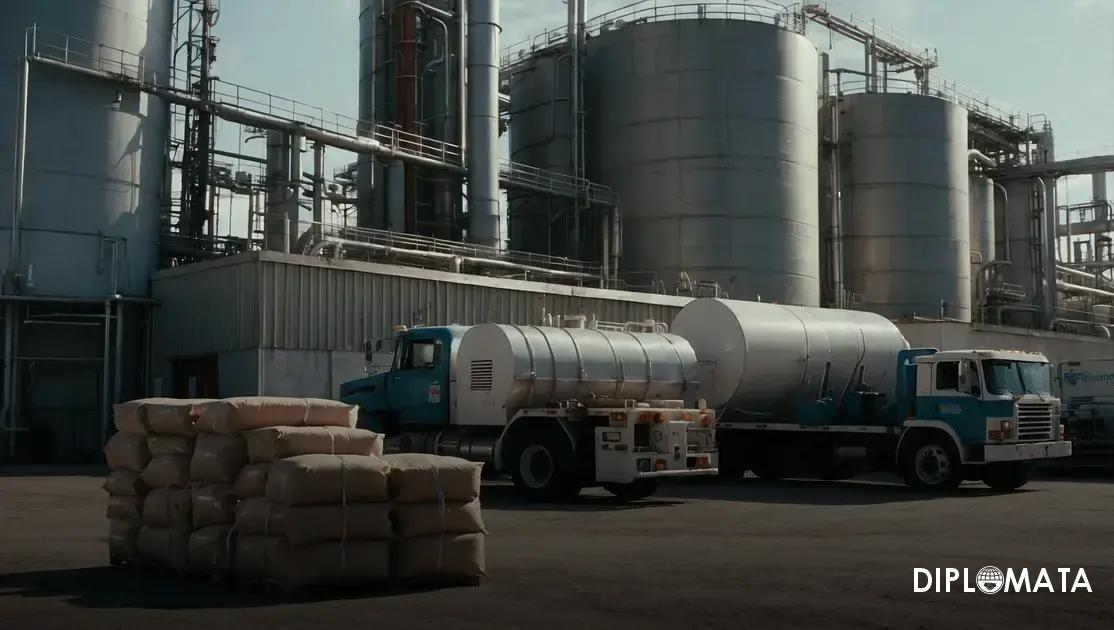In the competitive world of oleochemicals, negotiating palm fatty acid prices in bulk requires a strategic, data-driven approach.
This guide, informed by two decades of experience in chemical manufacturing, importing, exporting, and distribution, translates complex market dynamics into actionable tactics.
The aim is to help procurement teams secure sustainable, high-quality PFAs while safeguarding margins and supply continuity.
By combining practical negotiation playbooks with rigorous supplier evaluation, you can turn price discussions into value-driven partnerships.
The Diplomata Comercial advantage—rooted in a global network, rigorous quality control, and a commitment to reliability—serves as a reference point for buyers and sellers alike.
If you’re seeking a trusted partner for bulk palm fatty acids, the steps below reflect real-world methods used by companies across HPPC, pharma chemicals, industrial chemistry, and nutrition sectors.
This guidance emphasizes Supply chain alignment, risk mitigation, and tangible outcomes that translate into cost efficiency without compromising specification adherence.
How to Negotiate Palm Fatty Acid Prices in Bulk: Proven Tactics for 2025
Begin with a precise objective for your bulk PFAs program and translate it into measurable negotiation targets.
This includes volume commitments, delivery windows, and quality benchmarks that reduce post-purchase surprises.
In practice, procurement teams start with a formalized demand forecast, converted into monthly and quarterly
requirements.
This clarity allows you to benchmark offers against internal goals and external market signals.
From the very first interaction, emphasize a partnership mindset.
Price discussions anchored in long-term value outperform short-term discounts that erode supply resilience.
Benchmarking Palm Fatty Acid Prices: How to Set a Realistic Target
Before entering price talks, establish a robust benchmarking framework.
This means gathering credible market indicators, supplier quotes, and historical pricing trajectories, then normalizing them to your spec.
Use a clear set of reference points: base price per metric ton, freight terms, and quality or grade differences.
Having these metrics documented reduces ambiguity in negotiations.
From experience at Diplomata Comercial, we see buyers who prepare a detailed price map outperform counterparts who rely on gut feeling.
A well-constructed benchmark reduces negotiation cycles and supports faster, more confident decisions.
- Volume-weighted price bands keyed to monthly throughput
- Quality-adjusted pricing that accounts for PFAD vs. refined palm fatty acids
- Delivery location adjustments (FOB, CIF, or DDP terms)
Tip: Always compare multiple suppliers and run a simulated bid to identify outliers and establish a fair price range.
This practice, combined with a transparent, data-backed approach, strengthens your negotiation position.
Structuring Your Bulk Agreement: Flexibility and Protections
A well-constructed contract aligns incentives and creates predictability.
The negotiation framework should cover price review intervals, adjustment mechanisms, and risk-sharing clauses that protect both sides.
Consider price renegotiation windows tied to major market shifts, while maintaining a floor and cap to reduce volatility exposure.
This balance helps you manage procurement costs over time without sacrificing supply reliability.
Key terms you’ll see in mature PFAs agreements include clear definitions for Incoterms, payment cadence, and any incentives tied to on-time delivery or quality performance.
These elements contribute to a stable supply chain and predictable budgeting.
Smart Supply Alignment: Building a Bulletproof Palm Fatty Acid Supply Plan
Strategic supply alignment ensures you don’t chase lower prices at the expense of continuity.
A resilient plan combines supplier diversity, long-term relationships, and proactive risk management.
Long-term contracts with credible suppliers provide security against price spikes and supply interruptions.
This is a cornerstone of sustainable procurement for palm fatty acids and related oleochemicals.
In our work with global buyers, the strongest sourcing programs feature formal supplier evaluation, clear escalation paths, and regular performance reviews.
These practices reduce disruptions and improve negotiation leverage over time.
Assessing Supply Stability: Why Long-Term Contracts Matter
Stability in PFAs supply is often more valuable than a one-off discount.
A stable supplier relationship supports higher-quality materials, consistent purity specs, and predictable lead times.
Long-term contracts enable you to lock favorable pricing bands while the supplier commits to supply continuity, traceability, and compliant documentation across shipments.
At Diplomata Comercial, our model combines technical due diligence with a global logistics network to ensure reliability even when market conditions fluctuate.
This approach minimizes the frequency of price renegotiations and protects production schedules.
Supplier Evaluation Checklist: The Diplomata Approach
To build confidence in your palm fatty acid sourcing, use a structured evaluation framework that covers:
- Technical capabilities and process controls to ensure consistent PFAs quality
- Regulatory compliance and audit readiness for international trade
- Traceability and documentation flow from origin to destination
- Financial stability and risk management practices
Perform site visits, verify third-party lab results, and request batch-level certificates of analysis.
This meticulous diligence pays off in fewer quality deviations and smoother price discussions.
Pricing Structures and Negotiation Tactics for Palm Fatty Acid in Bulk
Choose a pricing architecture that matches your risk appetite and production planning needs.
The right model can reduce total cost of ownership while preserving quality and supply reliability.
Different pricing structures exist, from fixed-price contracts to floating or indexed models.
The best choice depends on market volatility, your forecast accuracy, and the intention to secure stable inputs for planning cycles.
Always pair pricing with terms that support cash flow and credit risk management.
Balanced terms help maintain supplier goodwill and ensure ongoing access to high-quality PFAs.
Fixed vs Floating Price Models
A fixed-price model offers budget certainty but may require a longer-term horizon and a robust risk premium to cover possible volatility.
Use fixed pricing when your demand is highly predictable and you have ample storage and inventory capacity.
A floating or indexed model aligns price movements with market benchmarks, providing continuous adjustment as conditions change.
This can be advantageous when demand is variable or when you have agile procurement capabilities.
In practice, a blended approach—part fixed for core volumes and part indexed for incremental demand—often delivers the best balance of predictability and flexibility.
Diplomata’s clients frequently adopt this hybrid strategy to stabilize costs while preserving the ability to scale.
Volume-based Discounts and Step-Pricing
Step pricing rewards larger commitments with progressively lower unit costs.
For bulk palm fatty acids, negotiate tiers tied to monthly or quarterly volumes that align with production schedules.
Explicitly define when tiers apply, how adjustments are calculated, and how secondary costs (handling, packaging, or additives) are treated.
Clarity in tier thresholds prevents disputes later in the contract.
When implementing step discounts, ensure that you have a clear mechanism to measure actual delivered volumes against planned volumes.
This reduces the risk of disputes over performance against targets.
Payment Terms and Credit Risk Management
Credit terms can significantly impact total landed cost.
Negotiate terms that protect your liquidity while providing the supplier with reasonable payment assurances.
Consider milestones tied to shipment receipt or QA clearance, and include documented acceptance criteria for each lot.
This reduces the incidence of non-conforming material and the potential for financial holdbacks.
Effective credit management is a mutual obligation.
Diplomata Comercial emphasizes transparent credit processes, timely invoicing, and clear dispute resolution steps to maintain healthy partner relationships.
Quality, Compliance, and Traceability as Negotiation Leverages
Quality and regulatory compliance are not mere afterthoughts; they are strategic levers in PFAs negotiations.
Superior specifications and robust documentation enhance confidence, enabling more favorable terms.
Traceability from origin to port of discharge reduces compliance risk and supports sustainability claims that many buyers now require for their brands and customers.
Investing in QA/QC processes and third-party testing outcomes provides concrete data to justify pricing decisions and to defend against price erosion due to quality variability.
SPEC and Certification as Negotiation Anchors
Clear specifications define the material you will receive, reducing ambiguity and quality risk.
Build specifications around purity, color, moisture, acid value, iodine value, and sediment content.
Certifications—such as accredited laboratory tests and supplier third-party audits—strengthen your negotiation posture.
They serve as objective anchors for pricing discussions and help validate performance claims.
Diplomata Comercial integrates rigorous quality control with a global sourcing network, delivering PFAs that meet stringent specifications while maintaining supply continuity.
This combination supports predictable pricing and dependable performance across batches.
Traceability and Regulatory Compliance as Leverage
Traceability adds value beyond the material itself.
It enables you to verify sustainability claims, regulatory compliance, and supply chain integrity, which are increasingly important to buyers and end-users.
Establish documentation practices that cover origin certificates, quality certificates, COAs, and transport documentation.
These artifacts protect you in audits and support favorable payment terms.
Operational Excellence: Logistics, Incoterms, and Supply Reliability
Efficient logistics and precise terms reduce hidden costs and improve predictability for bulk PFAs.
Align logistics with production schedules to minimize stockouts and avoid unnecessary inventory.
A well-managed logistics plan considers container capacity, transit times, port handling, and demurrage charges.
It also aligns with the contract terms you negotiated on price and risk.
Choosing the right Incoterms and transport routes is essential.
The balance between cost, control, and risk shifts with every delivery area and product specification.
Incoterms 2020/2025: What to Choose for Bulk PFAs
Incoterms define who bears risk and who pays for transportation, insurance, and duties.
For palm fatty acids, common options are FOB, CIF, and DDP, depending on whether your priority is supplier control or buyer risk mitigation.
In practice, FOB gives you control over shipping and port handling, while CIF shifts more risk to the supplier but increases your logistics management burden.
Your choice should reflect your internal capabilities and risk tolerance.
Diplomata Comercial advises clients on optimal Incoterms based on destination country, regulatory requirements, and the complexity of international shipping.
This reduces miscommunication and helps keep timelines intact.
Logistics Strategies: Lead Times, Inventory Buffers, and Sustainability
Lead times for PFAs can be affected by seasonal demand, refinery capacities, and global freight rates.
Build buffers that match your production cycles without inflating carrying costs.
Inventory buffers protect against supply disruption and price spikes.
They should be calibrated to your plant’s safety stock levels, production variability, and supplier reliability.
Beyond efficiency, sustainability considerations—such as traceable sourcing, carbon footprint, and responsible procurement—are increasingly integrated into the negotiation framework.
This adds qualitative value to price discussions and aligns with corporate ESG goals.
Practical Next Steps for Procurers of Palm Fatty Acids
To translate these tactics into tangible results, follow a structured action plan that starts with internal readiness and ends with a finalized, robust contract.
Begin by drafting a clear RFP that communicates requirements on quality specs, supply guarantees, and preferred pricing structures.
Share it with a curated set of reputable suppliers, including Diplomata Comercial, to benchmark responses.
Proceed with a staged negotiation process, culminating in a pilot volume program to validate performance before committing to extended terms.
Prepare Your RFP and Questions to Ask Suppliers
In your RFP, specify:
- Technical specifications for palm fatty acid, including purity and acid value
- Required traceability, certificates, and audit rights
- Preferred Incoterms, payment terms, and escalation mechanics
- Volume commitments, lead times, and contingency plans
Questions to ask suppliers include:
- What is your typical on-time delivery rate and how do you handle partial shipments?
- Can you provide COAs and QA/QC data for each batch?
- How do you manage market volatility and pricing transparency?
Pilot a 6-12 Month Supply Program with Phased Milestones
Launch a phased plan to test supplier performance, starting with a pilot that covers a subset of your annual volume.
Use milestones tied to QA, delivery performance, and pricing adjustments.
Monitor KPIs such as defect rate, complaint resolution time, and load factor.
If performance exceeds expectations, scale up the program with revised terms that reflect improved predictability and shared gains.
Diplomata Comercial brings a proven track record of global sourcing, rigorous QA, and reliable logistics.
Our approach translates into tangible value for buyers seeking consistent PFAs supply and competitive pricing across markets.
Para empresas que procuram por fornecimento estável de ácido graxo de palma com qualidade garantida, é crucial trabalhar com parceiros que entendem tanto o aspecto técnico quanto o comercial da negociação.
A Diplomata Comercial oferece esse equilíbrio: tecnologia, escopo internacional e atendimento próximo, orientado a resultados.
Conectando com Diplomata: Como Podemos Ajudar seu Negócio
Com mais de 20 anos de atuação no setor químico e oleoquímico, a Diplomata Comercial é reconhecida pela qualidade, escala e cobertura global.
Nossos clientes se beneficiam de uma abordagem integrada que une fornecimento, importação, exportação e distribuição de matérias-primas.
Oferecemos suporte direto de especialistas que conhecem profundamente o PFAs, desde especificações técnicas até requisitos regulatórios e logística internacional.
Nosso portfólio, alinhado a padrões de qualidade elevados, facilita a construção de parcerias duradouras e negócios que crescem com o tempo.
Se você busca reduzir custos, assegurar entrega estável e manter a conformidade, comece pela nossa equipe de experts em supply chain, compliance e negociação de preços.
Próximos Passos Estratégicos
Resumo rápido dos pontos-chave e convite para avançar: alinhar objetivos de compra com uma estratégia de Supply robusta, estabelecer benchmarks realistas, escolher estruturas de preços que combinem segurança e flexibilidade, e reforçar a qualidade e a rastreabilidade como alicerces da negociação.
Para transformar esses insights em resultados concretos, entre em contato com a Diplomata Comercial.
Nossa equipe está pronta para revisar seu RFP, mapear fornecedores, e projetar um programa de aquisição de Palm Fatty Acid em bulk que equilibre custo, qualidade e continuidade de fornecimento.
Entre em contato hoje mesmo para uma consultoria estratégica gratuita sobre o abastecimento de palm fatty acids.
Descubra como nossa rede global, experiência técnica e compromisso com a excelência podem reduzir seus custos totais e elevar a confiabilidade de supply para a sua operação.
Frequently Asked Questions
What objective should I set when negotiating palm fatty acid prices in bulk?
Set a precise objective for your bulk PFAs program and translate it into measurable targets, including volume commitments, delivery windows, and quality benchmarks. This clarity lets you benchmark offers against internal goals and market signals, reducing the risk of surprises after you sign the contract.
How can demand forecasting improve bulk palm fatty acid price negotiations?
Begin with a formal demand forecast that translates into monthly and quarterly requirements. This clarity lets you benchmark offers against internal goals and external market signals, improving leverage and reducing the risk of overbuying or shortages.
Why should I adopt a partnership mindset in bulk PFAs price talks?
From the first interaction, frame price discussions around long-term value and collaboration rather than quick discounts. A partnership mindset enhances supply resilience, quality consistency, and predictable pricing over time.
What benchmarks should I use to set realistic palm fatty acid price targets?
Develop a robust benchmarking framework using credible market indicators, supplier quotes, and industry data. Compare offers against external benchmarks as well as internal goals, and factor in quality, service levels, and delivery terms.
What data belongs in a robust palm fatty acid pricing benchmark for bulk purchases?
Gather market indicators, supplier quotes, historical price trends, quality specifications, delivery terms, and risk data for palm fatty acids in bulk. Include currency considerations and hedging where relevant to reflect true total cost of ownership.
How do I compare supplier offers for palm fatty acids to protect margins?
Evaluate price versus quality, consistency, and service—lead times, QA/QC capabilities, traceability, and after-sales support. Run scenario analyses for different demand levels to see how proposed prices hold under change.
What risk mitigation practices help when negotiating bulk PFAs prices?
Align supply chain planning with procurement, diversify suppliers, and set clear quality acceptance criteria. Include contract clauses for penalties on non-conformity and price review provisions to mitigate risk.
What steps turn PFAs price negotiations into durable, value-driven partnerships?
Use negotiation playbooks and governance to drive value, not just price. Establish KPIs, conduct regular reviews, and pursue joint cost-reduction and quality-improvement initiatives to secure durable, value-driven partnerships.





